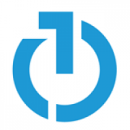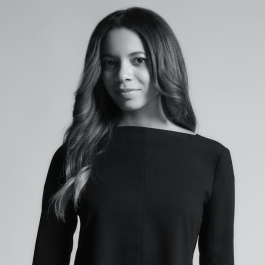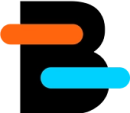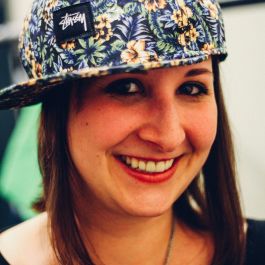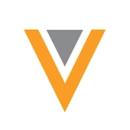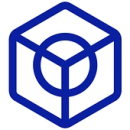Changing careers isn’t for everyone.
It’s an uphill battle of company and industry research, countless meetups, dozens of cover letters, competition with more experienced candidates, networking dates, and of course, rejection. Lots and lots of rejection.
Eight women from NYC tech shared why it’s worth it.
For them, the first step in their career transition was acknowledging that they were unhappy in their former careers. Some felt like they were stagnating in their positions, while others were envious of their friends’ blossoming tech careers. But all of the women we spoke with said the initial step was the hardest.
Choosing a new career path came next. To help identify what she wanted to do, Brandi Dunham, brand director at legal tech company Bodhala, turned to her mom for advice. Her mother said, “Identify what you’re most interested in and figure out how you can apply your talent to something you love.”
Starting a new career doesn’t have to feel like starting over. Being transparent with employers and networking connections (even if they aren’t in the tech industry) can help build a community of support. As well, joining tech meetups or making online connections can lead to mentorship and job opportunities.
While hiring managers might see a lack of tech experience on your resume, lean into past work experience and describe how those skills can be applied to the current role. If you’re excited about a role, that’ll show through. On most job applications, passion is an unwritten requirement.
Chang said to never underestimate the power of grabbing a cup of coffee. Taking 15 minutes to ask network connections about tech, career and companies helped her decide to pivot to her technical account manager position at The Trade Desk. Hearing negative information about a company or career you were originally interested in can be a huge time-saver.
When and why did you decide to make a career change?
I had two big career changes: one when I was 26 years old leaving Wall Street behind for the tech world and one this past December when I pivoted from being an account manager at The Trade Desk to becoming a technical account manager. Both changes were rooted in a desire to learn more. There were two steps I’ve used both times: introspection and grabbing coffee.
There were so many opportunities out there, so it was important for me to narrow down what I was looking for by figuring out what I was happy with and what I wanted to do next. I grabbed coffee with the individuals who held the role I wanted and the individuals working alongside that role. This exercise helped me get a taste of my potential job and feel out if I’d be excited about the opportunity or not. When it was a good fit, these conversations provided me with champions inside to help me through the hiring process because they wanted me on their team. When it wasn’t, that was valuable information for me to know too.
What challenges did you face while establishing yourself in this new career, and how did you overcome those challenges?
The biggest and scariest challenge has always been getting up to speed on the industry and learning how to do the job. I didn’t know anything about adtech when I joined The Trade Desk, but I watched YouTube videos, read white papers and asked a lot of questions. I didn’t know how to give a demo of a platform as an account manager when I first joined, but I practiced in front of 20 different account managers and asked them for constructive feedback. I didn’t know SQL, Command Line or Python when I switched to a technical account management role, but I’m reading books and taking classes online. I didn’t know what an API was or how to use one when I started in December, but I learned by trial and error. You overcome your fears by tackling them head-on. Remember that you were hired for a reason; you have the potential. The team is there to help you learn everything else.
What advice do you have for other people who are considering making a career change?
Network, network, network. Grab coffee to meet as many people as possible and learn about their different experiences, jobs and perspectives. Don’t be afraid to ask for help because warm introductions are easier than cold calls. I spoke to at least 15 different people about 15 different companies before homing in on The Trade Desk. I spoke to at least five different people at The Trade Desk before I submitted my resume to make sure that the positive online reviews were true. I spoke to at least five different technical account managers to make sure that I knew what I was getting myself into. I grabbed coffee and got help from many different people to successfully make these career changes.
Dunham said the advice to apply her talent to something she loved is what propelled her to explore a career in tech. Applying to tech companies that merged with industries she had experience in helped her during the hiring process.
When and why did you decide to make a career change?
After years of leading marketing campaigns in fashion, beauty and the consumer goods industries, I found myself wanting a change from the formulaic techniques these companies were using to develop and promote their products.
During a moment of frustration in a past role, my mom offered me the following advice: “Identify what you’re most interested in and figure out how you can apply your talent to something you love.”
While hearing stories about the exciting projects my friends were working on at major tech companies like Facebook, Google and Salesforce made me happy for them, I started to realize that I was becoming a bit envious as well. This prompted me to shift my career path focus. I began reading about emerging tech companies and the impact they have on how society thinks and functions. As the tech world started to merge with other industries like fashion and beauty, I saw a window of opportunity and seized it.
What challenges did you face while establishing yourself in this new career, and how did you overcome those challenges?
Job titles are not always apples-to-apples from one company to another. For me, it was difficult to translate to hiring managers some of my obscure past titles at advertising agencies. At times, I felt that my skill set was being overlooked because the previous titles on my resume did not align with the role I was applying for, even if my experience was a great match.
It is really important to find a way to explain your background to a hiring manager, whether it be through a cover letter, a detailed resume or a personal note on LinkedIn. It is not guaranteed to work, but it was a necessary step for me to make a career change. I spent months writing personalized notes to hiring managers until I found a company that was the right fit.
What advice do you have for other people who are considering making a career change?
During the interview process, pay close attention to the company and team culture. You are more likely to enjoy your work when your needs and values are consistent with those in your workplace.
Before Fisher applied at cloud-based company DigitalOcean, she had zero cloud experience. She leaned into her customer service experience during the interview process and, once hired, educated herself on everything cloud, including trends and key players in the industry.
When and why did you decide to make a career change?
I made the decision to leave my former employer in September of last year. It was a great company and I enjoyed working there. However, my role required extensive international travel and I needed a change. I was initially interested in exploring customer experience roles at SaaS companies. It’s a space that I know well, so I thought it would be a seamless transition. I reached out to my mentor, and she helped me realize that I would be happier in a new space, exploring new challenges. We created a plan of attack for my search. I then started networking and sending my resume to former colleagues. I also browsed job sites. This is how I came across DigitalOcean. They had an opening for a vice president of support and success, and it was right up my alley. However, I had no experience with the cloud. I emailed the hiring manager, who was also the CTO, and within days, that person reached out to me. After a series of interviews with the team, I knew that DigitalOcean was the right home for me.
What challenges did you face while establishing yourself in this new career, and how did you overcome those challenges?
Learning a new space can be both intimidating and overwhelming. Earning a new team’s trust takes time. It’s imperative to engage your peers and strive to build strong partnerships early on. Last but not least, you have to adjust to a new boss. I took a number of steps to address the aforementioned challenges. I read up on everything cloud, including the market, the trends and the key players. I also relied on my team to further educate me on the industry, our business, our customers and our internal partners. Earning my team’s trust is a work in progress, but they’re already incredibly supportive.
What advice do you have for other people who are considering making a career change?
My first advice would be to find a mentor. It will make a world of difference. As you start considering a career change, discuss your decision with your mentor or someone you trust to give you candid feedback. Take your time and network. Ask yourself what kind of opportunity will make you happy. Try not to leave a bad situation for another. Research interesting opportunities and offers thoroughly. Do not settle for less. Negotiate a fair salary: you earned it. When you’ve found the opportunity that excites you, resign from your current role. Remember not to burn any bridges on your way out.
Dreyer-Oren credits her music background for teaching her perseverance and discipline. She used those traits to teach herself coding. As an office manager, she reached out to engineers at her company with coding questions before entering a coding bootcamp. With the help of her mentor, she landed a job and is now a software engineer at Healthify.
When and why did you decide to make a career change?
I finished school and became an assistant to a bank executive. I knew I wanted a career that would allow me to be both creative and analytical, not just one that I could suffer through to support my music habit, so I started learning to code. During my downtime at work and after hours, I did every online tutorial I could find. My boss, an expert in financial risk analysis, suggested I learn Python so I could help them on projects in the future. Having supportive supervisors gave me more confidence to keep going.
A few months after I started learning, however, my boss was laid off and my position was eliminated. I knew that I wanted to keep learning, but I wasn't ready to apply for programming jobs, so I took an office manager position at a startup that would allow me to build connections in the tech world while continuing to learn on my own. This was the smartest thing I did! I told the engineers at my new company that I was learning to code, and they were more than happy to help me. Eventually, one of them started giving me weekly lessons and became a mentor.
After two years of learning on my own, I entered a coding bootcamp and was able to get an internship with the help of my mentor.
What challenges did you face while establishing yourself in this new career, and how did you overcome those challenges?
Anyone who has spent time studying music knows that it requires dedication, rigorous study and a deep understanding of structures and patterns. I consider my musicianship to be a strong asset as a software engineer. However, when I was a new programmer, people — including my otherwise supportive supervisors in non-engineering positions — assumed that my music school experience was “fluff” and considered it to have no bearing on my skills or employability.
What advice do you have for other people who are considering making a career change?
Having a mentor is paramount. The market is heavily saturated with new bootcamp grads, and personal relationships are just as important as technical skills. There will come a time when you need someone to advocate for you, and building those relationships from the beginning is crucial.
Be ready to hustle. You will spend most of your free time learning to code. Build side projects that excite you. Take on freelance clients to build your skills. Everyone says “contribute to open source” but don’t tell you how; try googling “open source beginners <your programming language>” to get started. Personally, I wish I’d found tech events like Ruby for Good sooner. You might want to get into the industry sideways — for example, by working as a support engineer for a while. There are many paths to a software engineering job.
Meetup Groups for NYC Women in Tech
- The New York Python Meetup Group
- NYC PyLadies
- NYC Women Who Go
- WiTNY (Women in Tech New York)
Foisy said her career change took three years before she landed a role at Crossix. The first step was acknowledging that her interests were in the healthcare industry, not finance. Being transparent with her then-supervisors paid off; they introduced her to connections and advocated on her behalf.
When and why did you decide to make a career change?
As someone who has always been a “numbers” person, I became a CPA. After college, I worked in public accounting and consulting across banking and asset management clients. I enjoyed being challenged, scrutinizing large data sets and helping clients achieve their strategic initiatives. And while finance was the most logical application of my skill set, my interests lay in the healthcare industry.
To gain credibility in a new industry, I knew I needed relevant experience. I spent over a year researching and tapping my personal and professional contacts to understand what career paths matched my interests and skill set, and then I focused on how to pivot. I had honest conversations with my supervisors. Their support during my career shift was critical because they introduced me to their connections and advocated on my behalf.
What challenges did you face while establishing yourself in this new career, and how did you overcome those challenges?
My biggest challenge was trying to catch up and keep up with my peers that spent more time in the industry. Much of the terminology was foreign to me, and becoming versed required asking a lot of questions and independent research to understand the lingo and context and be able to converse with confidence.
What advice do you have for other people who are considering making a career change?
Making a career change takes time. For me it was a three-year endeavor. The effort, humility and patience all paid off.
There were no shortcuts, but each incremental step along the way was momentous, even if it was not obvious at the time. My advice is to lead with intention and take advantage of each open door. Even if it is only peripherally related to your end goal, it is worth pursuing. The people you meet and the things you learn along the way all contribute to finding clarity and narrowing your focus.
When transitioning out of Wall Street, Murray asked herself two questions as she hunted for her next career: “How could I add value” and, “How do I balance getting in the door versus getting the right position?” Murray said that a career pivot should be about what you’re trying to achieve long-term versus just getting another job. Asking the right questions is what led her to IEX.
When and why did you decide to make a career change?
I began my career on Wall Street as a trader on the commercial mortgage-backed securities desk. I studied finance in college, always had an interest in the markets and had a goal of graduating with a job at a bulge bracket bank, which made that seat ideal for what I wanted at the time. After three years of trading, I realized I wanted to be more entrepreneurial and learn how businesses were built from the ground up. It wasn’t clear how I would be able to make that transition, but I knew I had to be thoughtful and intentional about the avenue I wanted to take. Almost a year later, I left my trading seat and landed in a role where I could learn quickly and make a sizable impact at an early-stage startup.
What challenges did you face while establishing yourself in this new career, and how did you overcome those challenges?
There were two key questions I asked myself when settling into my new career.
First, how could I add value? I had to determine the ways in which the skill set I gained as a trader was transferable to a tech startup. This wasn’t easy since trading is so specialized and the product I traded was niche. However, as a trader, I managed client interactions, built relationships with a range of institutional investors and developed knowledge about the commercial real estate market. So when I explored roles, business development at a real estate-focused startup made a lot of sense.
Second, how do I balance getting in the door versus getting the right position? One of the challenges of making a career change is often needing to take a step backward before taking two steps forward, whether in the role itself, financially or otherwise. This can be tough to wrap your head around, and I struggled with the right balance between getting myself into the right environment to build knowledge that would propel me forward in the long-term and getting the “ideal” position that would look best on paper.
What advice do you have for other people who are considering making a career change?
Focus on your long-term objectives and be intentional. A career pivot should be much more about what you’re trying to achieve long-term versus just getting another job. In my case, I knew I wanted to learn how a business was built from the ground up and develop a diversified skill set to enable me to be an effective operator. That first business development role was my foot in the door. Since then, I’ve worked at seed-stage startups and high-growth companies and served in a variety of capacities that allowed me to touch every part of a business.
Figure out your story. Be able to clearly articulate the arc of your career, why you’re looking for a change and strong proof points for why you should be considered versus candidates with more direct experience.
Williams surrounded herself with a network of supportive people working toward the same goal. She started a women in computer science club at school, attended meetups and was active on Twitter. From there, she learned about an app development boot camp which eventually led to her engineering position at BlueCore.
When and why did you decide to make a career change?
I decided that I wanted to make a career change approximately six years ago. I had been working in publishing for about five years and found myself wanting to do work that was more technical and challenging. Software development felt like a good fit since it’s interesting and esoteric and there’s always something new to learn. This also isn’t the first career pivot that I’ve made; I’ve been a carpenter and an archaeologist in other past career iterations.
For me, the biggest step to making this career change happen was translating the idea that I wanted to make this move into concrete actions. Once I had jumped that hurdle, I started talking to friends who were developers and they pointed me at some beginner resources. I also started going to a ton of meetups, and through one of those meetups, I learned about an app development boot camp being run in the evenings after work. I signed up and that experience really helped me build some solid skills. Based on that experience and the desire to build stronger foundational skills, I enrolled in an evening program at Hunter College to get a second bachelor’s degree in computer science. I applied to Bluecore’s internship program in my senior year, had an amazing summer and came back in January to be a full-time engineer.
What challenges did you face while establishing yourself in this new career, and how did you overcome those challenges?
Working full time while pursuing a computer science degree at night was one of the most challenging things that I’ve ever done, especially with almost no background in math and limited experience in programming. I’ve also faced some common negative and demoralizing experiences with being a woman in tech as well as some very discouraging age discrimination in my job search.
One of the things that was helpful for me was finding and building a community of other women working toward the same goals that I was. I started a women in computer science club at my school, and this was a huge force for keeping me grounded and finding and sharing resources.
Perseverance was the biggest factor in overcoming obstacles around being an older, career-changing job-seeker. After facing rejection and dead ends in my job search because of my age, I got a call from a really amazing recruiter at Bluecore who let me know upfront that one of the reasons that my resume stood out to him was that I was a career changer and that he was interested in hearing my story. The New York City tech ecosystem, in general, is a very good place to be for nontraditional candidates; we’re a city that embraces diversity.
What advice do you have for other people who are considering making a career change?
Don’t be afraid of hard work or rejection, and don’t give up on yourself if making your career transition feels difficult or if you face discrimination or setbacks. It’s going to be challenging stepping out of your comfort zone to do something new, especially if you have some degree of experience or standing in your current field. There are also a lot of real hurdles to get over along the way. But try to keep moving forward and be creative about applying what you’ve learned in your previous career to your new one. Work every network you have, apply for every single job that interests you and jump on every opportunity you see. And don’t be afraid to shift your strategies as you go.
Prohovnik credits tech meetups for landing her job in tech and eventually at Spotify. Through networking opportunities, Prohovnik found people with similar interests and passions and actively looked for job opportunities. When those two paths intersected, she was offered a job as a product manager.
When and why did you decide to make a career change?
I moved to NYC when I was 22 and my only real job experience was in retail. My dream was to work at a tech company, but I always found a reason not to apply. I’d either convince myself that the company was so cool they were drowning in applications and wouldn’t even see mine, or I’d show my cover letter to a friend and they’d tell me they didn’t think I was qualified and I’d listen. It just seemed like an impossible dream.
What challenges did you face while establishing yourself in this new career, and how did you overcome those challenges?
I started going to tech meetups. My primary reason for wanting to work in tech was to hang out with people like me, people who signed up for Twitter the day it launched, who made websites for fun and who preferred spending their weekends tinkering indoors. I made a bunch of friends and one day, a guy I’d bumped into a few times tweeted that his startup was looking for a support associate. I immediately DM’d him and told him sort of jokingly that I was interested. We went out for lunch and he hired me after that one conversation. I ended up staying at that startup for four years and growing into a product manager role, and my career has just taken off from there.
I always think back on how random and arbitrary this whole thing seemed, and how quickly my whole life changed. I used to describe it to people as getting lucky or being in the right place at the right time, but I’ve since convinced myself that it was because I immersed myself in stuff that I loved with people I was interested in and that genuine interest and passion came through.
What advice do you have for other people who are considering making a career change?
My advice to anyone considering a career change is to follow their instinct, even if it’s not yet clear what “career” might come out of whatever they’re drawn to. Most of all, never assume that you’re not qualified or that you couldn’t get an interview. As someone who’s been on the hiring side for years now, I’m always very excited about someone who’s passionate or brings a unique perspective to what we’re doing, even if they don’t have the formal background yet.



